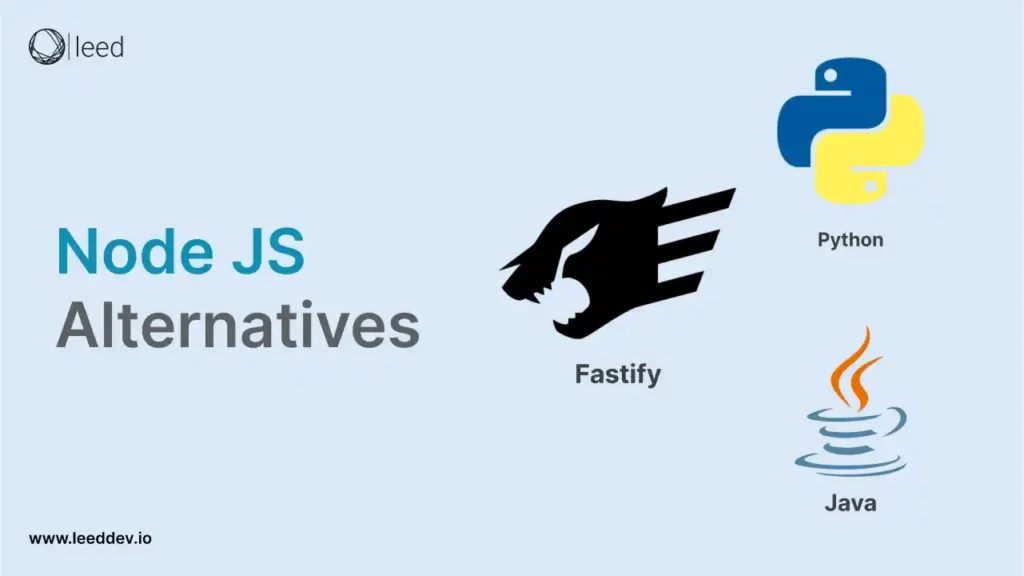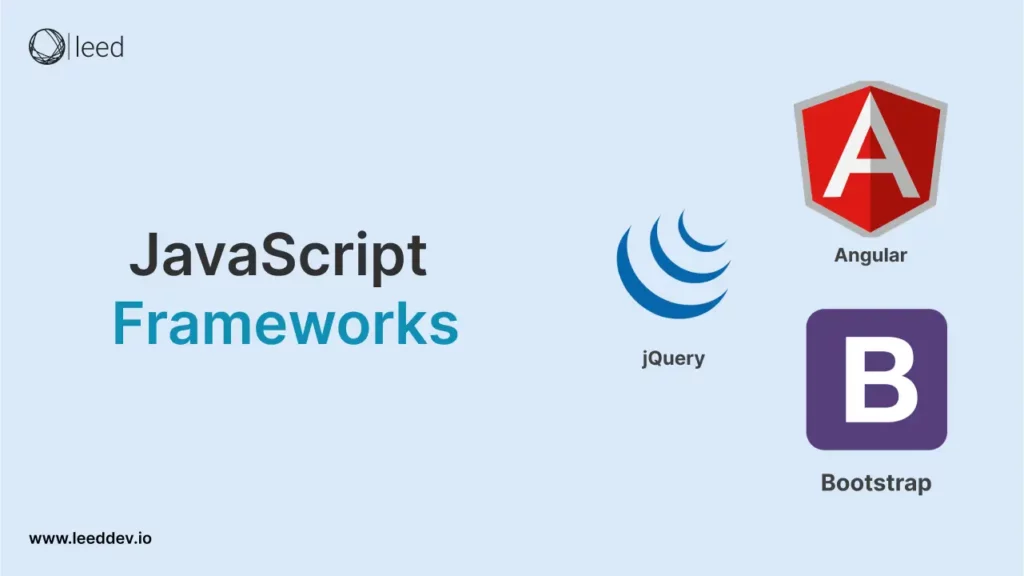While Node.js remains a favorite in the backend world for its speed and JavaScript based environment, it’s not without flaws. Many developers run into issues with CPU intensive processing, limited type checking and challenges with certain libraries. These limitations can slow down your project and impact scalability, especially as demands grow.
Thankfully, several Node JS Alternatives have emerged each offering unique strengths that can better suit specific needs. Let’s have a detailed look at it.
What is Node.js?
Node.js is an open source cross platform runtime that lets run JavaScript on the server side and not just in the browser. Built on Chrome V8 engine, it’s fast and efficient using an event driven non blocking model. This makes it ideal for real time data heavy applications like chat apps, video streaming and APIs. Developers use Node.js to build scalable and high-performance web apps on Windows, Linux or Mac all for free.
Read Also: Top 5 Laravel Alternatives for Developers
Key Features
Some of the main features of NodsJS are as follows:
- Asynchronous & Non-Blocking
- Single-Threaded
- Event-Driven
- High Performance
- NPM Support
- Cross Platform
- Scalable
- Microservices Friendly
- JavaScript Everywhere
- Open Source
7 Best Node JS Alternatives
Let’s take a quick look at the top 10 alternatives to Node JS. Know their features, pros and cons to help you find the right fit for your next project in 2025. Ready to explore? Let’s dive in!
Deno
Deno is a modern secure JavaScript and TypeScript runtime created by Ryan Dahl the original creator of Node.js. It was designed to fix the flaws of Node.js, such as security risks and complex module management. Built on the V8 engine and written in Rust, Deno offers a fast, clean, and secure development environment.
Key Features of Deno
- Built-in TypeScript support
- Secure by default (permission-based access)
- Uses modern ES Modules with URL-based imports
- Ships with built-in tools (linter, test runner, formatter, bundler)
- No node_modules or NPM simpler dependency management
- Runs on a single executable
Pros & Cons
| Pros | Cons |
| Secure execution with permission control | Smaller ecosystem than Node.js |
| Native TypeScript support | Limited third-party libraries |
| No need for NPM or node modules | Not fully supported by all cloud providers |
| Built-in tools (testing, linting, bundling) | Some Node.js modules are not compatible |
| modern architecture | Slight learning curve for Node.js developers |
Python
It’s a widely used high level programming language known for its simplicity, readability & vast library ecosystem. It’s a popular choice for web development but it also excels in data science, AI, automation & scripting.
Key Features of Python
- Clean, readable syntax, easy for beginners and fast for prototyping
- Rich standard library and third-party tools
- Strong support for data science, ML, and automation
- Cross platform (Windows, Linux, macOS)
- Supports multiple paradigms: OOP, functional, procedural
- Mature frameworks (Django, Flask) for quick web development
Pros & Cons
| Pros | Cons |
| Beginner-friendly and easy to maintain | Slower than compiled languages (e.g., Go, Rust) |
| Large ecosystem for web, AI, and scripting | Not ideal for multithreaded or real-time applications |
| Great for rapid prototyping and MVPs | GIL (Global Interpreter Lock) limits true concurrency |
| Cross-platform and flexible in design style | Higher memory usage |
| Strong community and documentation | Less suitable for mobile development |
Go
Go is a statically typed compiled programming language developed by Google, Known for its simplicity and speed Go is ideal for building fast backend systems. It offers strong support for concurrency through goroutines and is widely used in cloud native technologies like Docker and Kubernetes.
Key Features of Go
- Statically typed and compiled for fast, efficient performance
- Lightweight concurrency via goroutines and channels
- Built-in garbage collection for memory management
- Fast compilation and minimal runtime overhead
- Cross-platform compatibility (Linux, Windows, macOS)
- Rich standard library for web servers, networking, and more
Pros & Cons
| Pros | Cons |
| High performance, compiles to machine code | Verbose error handling |
| Built-in concurrency model with goroutines | Limited GUI development capabilities |
| Simple, readable syntax with few keywords | Smaller ecosystem than Node.js |
| Easy deployment via single binary | Learning curve for dynamic language developers |
| Strong standard library reduces external dependencies | Less demand in job market compared to Node.js but growing |
Rust
Rust is a high performance systems level programming language focused on memory safety, speed & concurrency. It’s ideal for building networking tools, operating systems, and high performance web applications especially where low level control is crucial. Unlike Node.js Rust is compiled and doesn’t rely on garbage collection.
Key Features of Rust
- Memory safety via ownership and borrowing (no garbage collector)
- High performance comparable to C/C++
- Zero-cost abstractions with minimal runtime overhead
- Compiler prevents data races
- Powerful pattern matching and error handling (Result, Option)
- Cross-platform support and easy package management with Cargo
Pros & Cons
| Pros | Cons |
| Top-tier performance and safety | Steep learning curve, especially with ownership model |
| No garbage collector, predictable memory usage | Longer compile times |
| Concurrency without data races | Still-maturing ecosystem |
| Strong compile-time checks reduce bugs | Complex for beginners from dynamic or GC-based languages |
| Active, growing community and tooling (Cargo, crates.io) | Less web-focused ecosystem compared to Node.js |
ASP.NET
ASP.NET is a powerful open source web framework by Microsoft used for building dynamic, scalable and secure server side applications. It supports C#, F#, and VB.NET and is ideal for enterprise grade and cloud integrated applications. Like Node.js, it works across Windows, macOS and Linux but offers tighter integration with the Microsoft ecosystem.
Key Features of ASP.NET
- High performance and scalability for large-scale applications
- Cross-platform support via .NET Core
- Built-in cloud integration and support for microservices & containers
- Strong security with built-in authentication and authorization
- Backed by Microsoft with rich documentation and tooling
- Flexible development models: MVC, Razor Pages, Web API
Pros & Cons
| Pros | Cons |
| Fast performance and automatic memory management | Fewer libraries than Node.js or JavaScript ecosystem |
| Robust security out-of-the-box | Advanced tools (e.g., Visual Studio Pro) require paid licenses |
| Great for large, enterprise-grade applications | Some third-party integrations may be less seamless |
| Supported by Microsoft with extensive resources and updates | Transition from older ASP.NET versions to Core can be challenging |
| Excellent support for cloud-native development (Azure, AWS) | Slightly steeper learning curve for non-Microsoft developers |
Elixir
Elixir is a functional concurrent programming language built on the Erlang VM (BEAM). It is known for its fault tolerance & massive scalability. With a syntax inspired by Ruby and architecture optimized for distributed systems, Elixir is ideal for real time high traffic applications like chat apps and messaging platforms.
Key Features of Elixir
- Functional programming with immutable data for safer, more predictable code
- Built-in concurrency using lightweight processes (not OS threads)
- Fault tolerance via “let it crash” approach and supervisor trees
- Clean, Ruby-like syntax for easier development and maintenance
- Tools like Mix for dependency management and testing
- Runs on the Erlang VM, proven for telecom-grade reliability
Pros & Cons
| Pros | Cons |
| Handles millions of concurrent users efficiently | Steep learning curve for devs from OOP backgrounds |
| Built-in fault tolerance creates resilient, self-healing systems | Smaller ecosystem compared to Node.js or Python |
| Extremely lightweight and cost-effective infrastructure | Harder to find experienced Elixir developers |
| Clean syntax improves code readability and developer productivity | Less suited for CPU-heavy tasks (e.g., number crunching) |
| Excellent documentation and tooling (e.g., Mix) | Metaprogramming can lead to confusing code if overused |
Ruby on Rails (RoR)
Ruby on Rails is a full stack server side web application framework written in Ruby following the MVC architecture. It’s known for its Convention over Configuration principle and rapid development capabilities making it ideal for content driven websites and fast product launches.
Key Features of Ruby on Rails
- MVC architecture separates logic, interface, and control layers for cleaner code
- Active Record ORM simplifies database interactions using Ruby instead of SQL
- Convention over Configuration reduces boilerplate code and setup time
- Built-in tools for testing, debugging, and performance optimization
- Access to a vast ecosystem of packages via RubyGems
- Best suited for apps with frequent data updates (e.g., blogs, e-commerce)
Pros & Cons
| Pros | Cons |
| Faster development due to conventions and powerful generators | Not ideal for real-time apps (e.g., chat, live data) |
| Active Record allows easy database handling | Can struggle with highly scalable microservice architectures |
| MVC architecture supports team collaboration and parallel workflows | High memory usage and heavier resource consumption |
| Strong package ecosystem via RubyGems | Slower performance on resource-heavy tasks |
| Great for content-heavy apps and CRUD applications | Less flexible compared to unopinionated frameworks like Node.js |
Summarizing It!
While Node.js remains a top choice for real time event driven applications it’s not always the best fit especially when dealing with CPU heavy tasks, type safety or large scale enterprise systems. Fortunately alternatives like Deno, Python, Go, Rust, ASP.NET, Elixir & Ruby on Rails each bring unique strengths designed for specific needs whether it’s performance, security, scalability or rapid development.
Choosing right tech stack depends on your project requirements, team expertise and future scalability plans.
At Leed Software Development, we specialize in helping businesses choose and implement the right technology for the right job. Whether you need:
- A real-time chat app with Elixir
- A secure, scalable enterprise solution with ASP.NET
- A fast, cloud-native backend with Go or Rust
- Or a content-rich web platform with Ruby on Rails
We’ve got the experience and talent to bring your vision to life. From initial tech consulting to full-cycle development, Leed ensures your application is efficient, scalable, and future-ready.
Let’s build something powerful together. Contact Leed Software Development today!
FAQs
Why should I consider an alternative to Node.js?
While Node.js is fast and great for real-time applications, it struggles with CPU-intensive tasks, type safety, and sometimes scalability. Alternatives like Go, Rust, or Python can offer better performance, security, or ease of development depending on your project.
Which Node.js alternative is best for high-performance applications?
Go and Rust are excellent choices. Go offers lightweight concurrency with goroutines, while Rust provides memory safety and C-level performance ideal for large-scale, performance-critical systems.
What’s the best option for building secure enterprise applications?
ASP.NET is a strong candidate due to its built-in security features, enterprise-level support, and seamless integration with Microsoft’s ecosystem.
Can Leed Software Development help me choose the right framework?
Absolutely. Leed Software Development offers technology consultation services to analyze your requirements and recommend the best tech stack whether it’s Python for data-driven apps or Elixir for concurrent systems
How can I ensure my app is scalable and maintainable long-term?
Choosing the right architecture (e.g., microservices with Go or ASP.NET), using maintainable code practices, and implementing proper CI/CD pipelines are key. Leed helps you design scalable systems and maintain them with continuous support.
Does Leed Software Development work with all these technologies?
Yes! Our diverse team includes experts in Node.js, Go, Python, ASP.NET, Ruby on Rails, Rust, Elixir, and more. We match your project with the right developers to ensure high-quality, tailored solutions.




